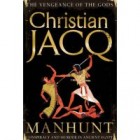Call me a glutton for punishment, or perhaps just a glutton for an Ancient Egypt setting. Even my recent experience involving Paul Dohertys disappointing The Mask of Ra couldnt put me off a bit of free time travel. (And given that its the end of the year, and flights are ultra expensive, vicarious travel, particularly when it comes to travel back in time, is about all I can afford to pony up for.) Id heard good things about Jacq, who not only has dozens and dozens of books to his name, but also a fairly impressive standing as a world-renowned Egyptologist.
Unfortunately, and quite honestly to my chagrin, Manhunt doesnt live up to expectations. If it were a pyramid, it would be the architecturally defective one of Meidum. Or perhaps one with which a bunch of people have been playing Jenga: because its lacking a good deal in structural integrity, and in a good deal more besides. I was supremely disappointed by this, having picked up the sequel as well as another book by Jacq in the expectation that I would thoroughly enjoy this.
Manhunt essentially plays out the way that the title suggests: it involves a young scribe named Kel who rocks up to work one day only to find that all of his fellow scribes, bar one who is missing, are slumped about on the floor. Poisoned milk is to blame, and Kel, being the one who habitually doles out said milk, is the number one suspect. So Kel, filching a mysterious coded papyrus for good measure, goes on the run. Along the way, he meets up with his actor buddy and ladies man Bebon, and the priestess Nitis, a trusting lass who, despite having known Kel for roughly a day, merrily aids and abets him as he tries to flee the authorities.
What unfolds is a bizarre caper that could work quite well as a Marx Brothers film, but which works less well as what is a reasonably sober novel about state corruption and subterfuge. Kel dashes off in one direction, dons a new identity, is safe for a while, and then is busted by a group of Egyptian police or an informer. Something terrible happens to his pursuersitems falling on their heads, a shying donkeyand Kel is off and running again. I do wonder whether Jacq wrote this to a soundtrack of Benny Hill music.
The narrative is achingly stilted and repetitive, with Kel getting out of more scrapes than the Blues Brothers, and exhibiting about as much personality along the way as the robots in Futuramas All My Circuits. This is unfortunately true of the entire book. Not only is the story flat and unbelievable, with a huge reliance on dei ex machina (perhaps because this is set during polytheistic times, giving Jacq plenty of gods to draw on), but the characters are little more than talking heads on the page. The relationship between Kel and Bebon is confused, and the all-of-a-sudden romance between Kel and Nitis feels hasty and illogical. (At one point we read: Kel realised that he would never see Nitis again. At this point he realised that he loved her passionately.)
In addition to this, there are strange sections of info-dumpery, such as a washer-man telling Kel how things are done here in Egypt, which surely Kel is aware of himself. The writing, too, is painfully dull, although I should note that this is a translation from the original French, so I cant comment on the original. For example, when the pharaoh hears of the death of his entire set of scribes he is devastatedthis is all the insight we get into his reaction. False suspense is rife: when Horkheb is on his deaths bed, he manages to croak out a phrase or two, and then drops off the perch just short of giving away the information that would result in Kels capture. The very next scene is one involving the leader of the conspiracy, a cheats way of keeping the reader from receiving the information they need to solve the puzzleit didnt work for Dan Brown, and it doesnt work here.
And then, oh my goodness, it ends on a cliffhanger. Still, given all thats come before it, Im happy enough to remain on that cliff for a bit, and shant be endeavouring to climb down via volume two for a while yet. I will, however, give Jacq a second chance at some point, as hes such a prolific and beloved author that Im willing to believe that this one is a misstep.
But to end on a mildly positive note, Manhunt is a book that is probably going to be read by many largely for the setting, and readers will find a few notable points of interest within its pages (and in the copious footnotes). Jacq is of course an academic specialising in Egyptology, and he does impart some fascinating tidbits about Egyptian life along the way. I was intrigued to learn about women being largely being treated as equals: they could be business owners, land owners, in control of their own fortunes, and could marry and divorce freely. I was also interested to hear about the introduction of formal currency from Greece, and to learn about the impressive approach to hygiene when it came to Egyptian cooking and food preparation: the Egyptians had a rudimentary form of germ theory going on, and knew not to contaminate meat with impure blades. This might not seem overly impressive, but do bear in mind how recently the west became aware of this issueit certainly wasnt two and a half thousand years ago.
Rating: 



 (serious flaws)
(serious flaws)
Support Read in a Single Sitting by purchasing Manhunt from
Amazon | Book Depository UK | Book Depository USA | Booktopia | The Nile














Love the term info-dumpery! Im always attracted by the covers of books with an Egyptian setting, but the Amelia Peabody series on audio is more my speed.